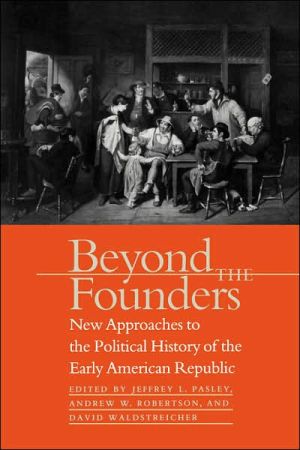

 |

|

The average rating for Beyond the Founders: New Approaches to the Political History of the Early American Republic based on 2 reviews is 3.5 stars.
Review # 1 was written on 2009-08-09 00:00:00 Roy Shak Roy ShakUseful but frustrating; this book's thematic center is surprisingly elusive. It ought not to be, I think, but it is. This collection is meant to showcase "the new new political history" or "the newest political history" -- histories of the Early Republic that attempt to keep politics at the center of American culture, and to keep culture at the center of politics. But the editors themselves seem at times to lack confidence in this project. They imply that it may be difficult to take the "cultural turn" without jettisoning social history in favor of intellectual and biographical history -- thus running the risk of again excluding ordinary people from politics yet again. But they do think this danger can be negotiated successfully. They also never seem to be entirely sure how new the sort of scholarship they're describing really is. In their introduction, the editors argue that the scholars of this new-new-political generation (David Waldstreicher himself might be the prime example) have been influenced by three main precedents, which they have been synthesizing. First, they have been influenced by the social histories of politics written by neo-progressives (such as Rhys Isaac and Alfred Young) in the 1960s and 1970s. Those studies directed attention to popular culture on a small scale, connecting the cultures of groups with changes in the overall political structure of the republic. Second, they have been preceded by the "new political history" of Lee Benson, Allan G. Bogue, and Samuel P. Hays, with which they have a more ambiguous relationship. The new political historians adopted an "ethnocultural" approach to group behavior that allowed for a rapprochement with intellectual history, but they also insisted on quantitative methodological rigor. The newest generation is happy to adopt the former but not especially interested in the latter. Third, the newest generation has been influenced by the infamous "linguistic turn." They embrace the concept of political "languages." But they are also reluctant to turn early American history into an exercise in textual analysis alone. They hope to retain the explanatory power and broad reach of social history. All in all, the newest political historians intend to produce a picture of a politics that was both cultural and efficacious. They see early America as having both "a deeply politicized culture and an indefatigably cultural politics" that was "the resort of both the high and the low when ordinary politics remain(ed), on certain key issues, intractable" (10). The editors suggest that this approach reveals a greater degree of continuity between revolutionary politics and antebellum politics than older political and social histories have done. I believe there is indeed a clear generational shift at work in this volume, but I suspect it has as much to do with the personal mentalities of younger historians as with their professional scruples. It seems to me that the scholars represented in this volume are noteworthy, above all, for their pragmatism and catholicity. They are happy to use whatever mixture of sources and voices will produce interesting history, provided it covers diverse sorts of people, and they are difficult to identify as members of a movement. The one thing they are most likely to try to avoid is reductivism. Even when they do go out of their way to avoid writing exclusively about "great white males," they seem to do it almost as much for the sake of variety as for the sake of ideology. If I'm right, then this may account for the lack of focus I see in the introductory and conclusive material. It just looks like the editors haven't entirely come to terms with the fact, or are reluctant to admit it. Actually, the most useful essay in the volume, on the whole, is hidden in the middle. American historians of many different periods could benefit from John L. Brooke's attempt to refine Jürgen Habermas's concept of the public sphere to match early American conditions. |
Review # 2 was written on 2016-11-09 00:00:00 Stephen Michaels Stephen MichaelsThis book is a collection of essays that seeks to look at the early years of the American republic, but without the recent emphasis in popular history on the founding fathers. It's not "great men" and momentous times, but a look at everyday lives and people who were also a part of the making of the nation. An occasional big name makes an appearance - such as Thomas Jefferson and his big cheese (literally) - but it's mostly people and movements that most of us haven't heard of, such as: - Young Federalists in the War of 1812 - The Anti-Rent wars of upstate New York - Early electioneering rituals - An enlightening look at the 2nd Amendment as it was interpreted around 1800 - and a lot more. It is sometimes dense reading, sometimes fun, and very enlightening. |
CAN'T FIND WHAT YOU'RE LOOKING FOR? CLICK HERE!!!